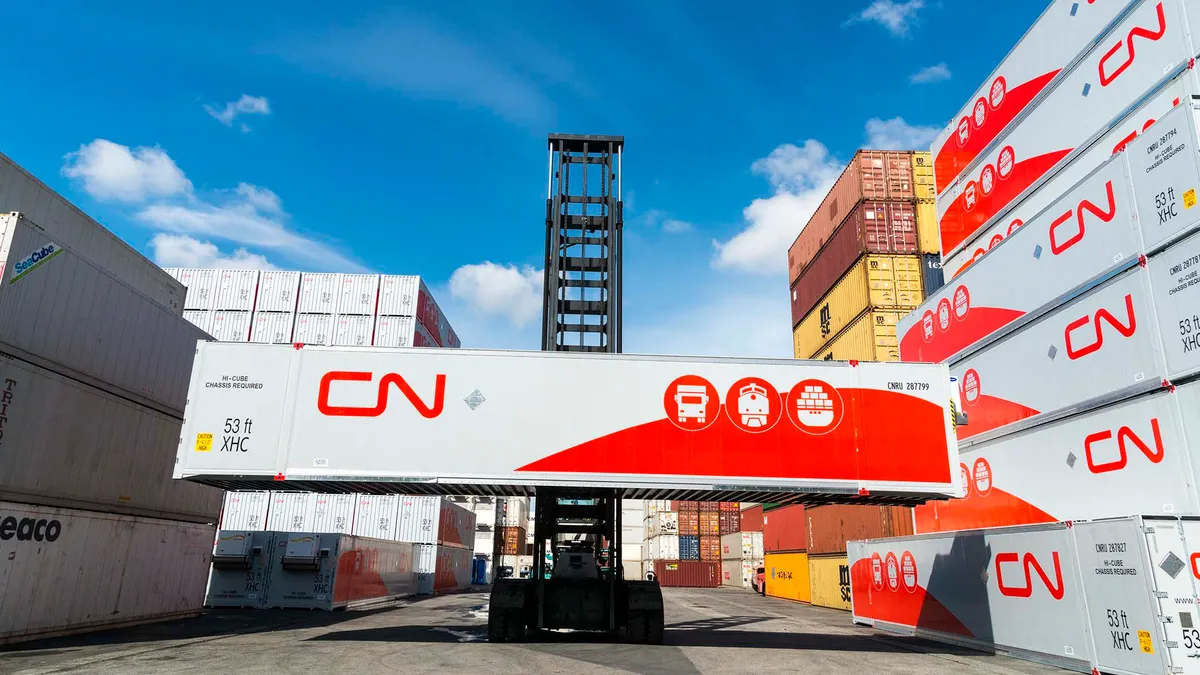Dozens of U.S. agricultural groups are urging Canada Prime Minister Justin Trudeau to step in and prevent a potential work stoppage or strike at the country’s two main railroads, warning a shutdown of transportation networks would create widespread disruption for grain farmers.
A labor deal impasse between the Teamsters Canada Rail Conference and carriers Canadian National Railway and Canadian Pacific Kansas City has led to a potential work stoppage that could start by Thursday. Both railroads also announced freight embargoes last week ahead of a possible shut down of their respective networks.
The impact of a strike would be particularly severe on agricultural and other bulk exporters as “trucking is not a viable option” for many grain shippers, according to a letter to Trudeau signed by 35 groups including the American Farm Bureau Federation and the National Grain and Feed Association.
“A work stoppage of any length of time means lost shipping opportunities that will never be recovered,” groups wrote in the letter.
Many biofuels facilities and grain mills that depend on uninterrupted rail service could run out of storage capacity and incur shortages of incoming raw materials, the letter added. Starting and stopping operations at these facilities is a complex process, meaning even a short-term labor disruption could be felt by the industry for weeks.
The Canadian trucking industry cannot meet the domestic needs to keep critical supplies and daily goods flowing if a work stoppage happens at the country’s major railroads, according to the leader of the British Columbia Trucking Association.
“There is no possibility trucking can fill the gap of any labour disruption on railways,” Dave Earl, president and CEO of the BCTA, said in an email to Trucking Dive.
Despite the soft freight market plaguing the U.S. trucking industry, Canada’s trucking industry is “already running near capacity,” Earl said, adding that “road transportation cannot come close to replacing the movement of goods that will be displaced from railways in the event of a dispute.”
U.S. trucking companies that operate in Canada are aware of a possible logistics crisis. A spokesperson for ArcBest said the carrier doesn’t expect Canadian rail disruption to impact its operation since most of its freight in Canada is transported over the road but stands prepared to handle any issues if problems arise.
While trucks will keep some domestic freight moving around Canada should the railroads shut down, it’s the transport of larger items that concern Earl.
He pointed to shipments of new vehicles arriving through the Annacis Auto Terminal at the Port of Vancouver, Canada’s largest, which handles 480,000 vehicles annually. Earl said if cars cannot move from the Annacis terminal on rail, eastern-based vehicle transport carriers will have nothing to deliver to dealerships.
The same scenario arises for shipping containers arriving in Vancouver, Earl said. If cargo typically transported to eastern and southern destinations in Canada isn’t moved on rail, distribution centers won’t be restocked, which means trucking companies have nothing to transport to stores for consumers to purchase.
“Far from an uptick in business, this will create significant disruption,” Earl said. Trucking may manage some of the displaced cargo, but he doesn’t see rail disruption creating a “boon for our sector.”
Peter Friedmann, executive director of the Agriculture Transportation Coalition, wrote in a LinkedIn post that while agricultural exporters may be able to use alternative routes or shift shipments to U.S. railroads, “there is only so much capacity.”
“Most Americans have no idea how dependent we are on the Canadian railroads,” Friedmann wrote. “Already, well before Canadian rail service/work stoppage actually happens, the congestion is rearing its disruptive and costly head.”
Nathan Owens contributed to this story.













